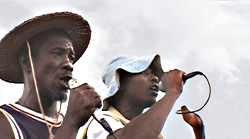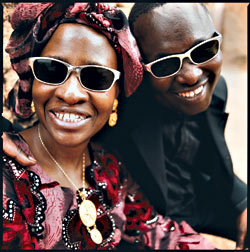The argument has been made that African music starts to sound the same after a while. Deep listening brings to mind the Grateful Dead if they played thumb pianos or kettledrums: flower-power lyrics of peace and uprising as a template for long, meandering jams. But no one spends lifetimes nitpicking the music as much as a Deadhead would (as in, “Dude, Guinean highlife tapes from the ’70s are way more transcendent than the ’80s”), because you simply can’t. You can rip the Dead because they were a lucrative machine. In Africa, the fortunes are reversed. Often, the machine is the reason for torment in Africa. The reason for music is for inspiration and for rising up.
The latest case in point is the Refugee All Stars, from Sierra Leone, a six-piece of ragtag but seemingly enlightened Afropop stars who grew momentum in western Africa last year after being profiled in a music documentary of the huge struggle that gave them their name. The Refugee portion comes from the 100-mile journey they made to the Sembakounya Refugee Camp in Guinea where they subsisted on shared chicken feed and dirty water, although refuge is more apropos to the music they sought escape with while rebels in Freetown pillaged their village and killed their kin and, most notably, their spirits.
The All Stars portion of their name, if a slightly self-aggrandizing one, is a bit of a misnomer. If by “All Stars” they meant reggae all-stars, that would work. But typically a band in Africa that goes by All Stars refers to a fusion of native sounds. While influences of highlife and local street music are evident, the group, by calculation, mostly removes itself from African tradition. See the movie and understand why: Nearly every note associated with the Africa they fled reminds them of death, and the reggae backdrop is the foundation by which songs build, a reverse approach to most African recordings. It is as if with music they are reversing their own fortune.
The importance of this development cannot be overlooked in the face of Sierra Leone’s musical legacy. This is the country in West Africa that often plays second fiddle to mainstays Guinea and Senegal in the Afropop scene, and given that many of its pop stars fled to mainland Europe and London during the decade-long civil war, the guise removes any claim to that history.
That the All Stars set their beats more to the score of reggae than to the native griot music of Freetown known as “goombay” might betray critical and loyal listeners of Africana. But all of that seems moot for two reasons. First, if their albums are indeed filed in the reggae section (the first LP is due in the fall; their only other album is lifted from the documentary about their struggle, which appeared as part of SIFF’s Face the Music program), they could be the best reggae records of the moment; and second, the means by which the group came to record the music is enough reason to be moved.
The period that brought the All Stars has an ominous beginning. It was called “Operation: Destroy Every Living Thing.” As civil war grew in the capital of Freetown, five musicians began writing songs in camp, including youthful hip-hopper Black Nature and a former taxi driver, Mohammed Bangura, who was forced to beat his child to death under the threat of rebels. As bandleader Reuben Koroma says in the film, encampment meant detraumatizing themselves with music. The sessions they had at the camp began as confessional poetry, but Koroma delivered an early edict: Leave the past behind. When playing, civil war did not exist.
When they returned to Freetown, they added a sixth member, Francis John Langba, and his acquisition was integral to making the group a cohesive unit. (He had been a member of the Sierra Wailers, and despite his acclaim, he had never recorded.)
For the tenure of the group, there is hardly any doubt what its swan song will be. “Living Like a Refugee” is a monumental lo-fi feat. “I just took all the problems, all the suffering of the people, and make a song with it,” Koroma remarks at the onset of the song. “You’ve got to sleep in a toppling house which is so hot,” he goes on. The chorus is a simple one- liner: “Living like a refugee is not easy.” One is left to think this is why African call-and-response music was made.





